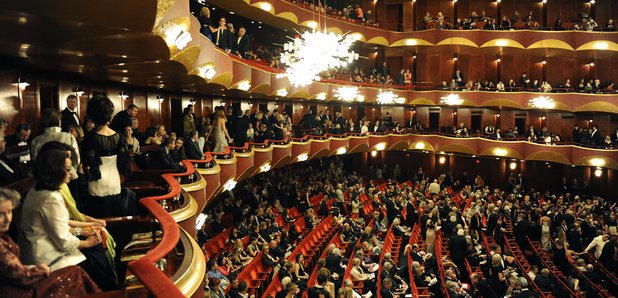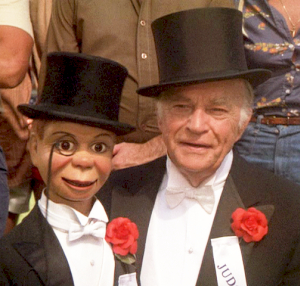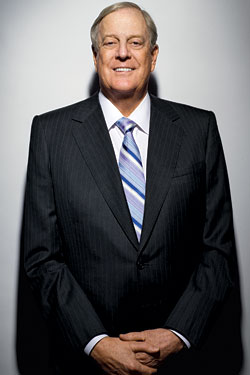In 2006, at the start of Peter Gelb’s tenure, the Metropolitan Opera announced a joint commissioning program with the Lincoln Center Theater, involving a wide range of prominent composers in all manner of styles, from Rufus Wainwright to Michael Torke to Ricky Ian Gordon. Not much has been heard about that program in the years since. This was the real reason I wanted to talk to Peter Gelb in connection with my two-part article on American opera (Part Two should be on line by day’s end). And when I met him in his office in early June, after our discussion about stage directors, we actually did talk, at least a little bit, about new opera.
Peter Gelb: I’m going [to London next week] for two reasons. One is to sit in on the workshop of the new Nico Muhly piece [“Two Boys,” which will have its world premiere at the English National Opera in June, 2011 before coming to the Met in 2013], and the other is to see the final models and sets of [Des McAnuff’s production of] “Faust.” We’re the lead producer on this, even though it’s starting there. Both of these. And in the case of the Nico Muhly thing… it ties into how we develop things. On this couch, I think in 2007, I think André Bishop was here with me, who is our partner [Bishop heads the Lincoln Center Theater], and [Nico] mentioned two or three ideas, one of which was the internet murder idea. [“Two Boys” is a fictional story inspired by the true story of a 14-year-old boy who posed as a woman in Internet chat rooms hoping to find someone who would murder him.] And André and I both looked at each other and said, “Well, if that’s the one that you’d really find the most fascinating, it’s certainly very interesting, why don’t you pursue that.”
Part of the idea behind the commissioning program is to put an equal emphasis on the theatrical possibilities of opera. It’s all about increasing the chances for success, the same reason we try to hire great directors. In the case of a new composition, besides having a very talented and gifted composer, the idea was to pair him with a talented librettist, who in this case is the playwright Craig Lucas. They had never met before we introduced them. One of the points of this program is to be a matchmaker. And we also very early in the process brought Bart Sher into it, who has directed Craig’s plays on several occasions. It wasn’t so that Bart could write it, it was so that Bart could be a sounding-board for them, and also so that he could direct the workshops. We’ve already done one [workshop], which was very successful, I thought. So we give them feedback. Some of which we find useful, and some of which they reject, it’s up to them. And now based on what they’ve done since then, there’s a second workshop, which will lead to the project being done over in London. But we are the sole commissioners, not ENO. The Met and Lincoln Center [Theater] together were the initial commissioners, up through the workshop phase, and now it was decided between André and me that this was the Met’s project as opposed to a project for the theater at Lincoln Center. Because it could have gone either way. At that point we became the sole commissioner, of a larger commission, to pay for a mainstage commission. The initial commission is much smaller financially and more geared [toward] getting it up through a workshop.
(read more after the jump)
Anne Midgette What’s the financial difference?
PG Well, it’s huge. I don’t think I really should tell you, but it’s like an extra zero.
ALM Well, it’s like $50,000 for the [commissioning program].
PG Right. A big commission -- I’m not saying it’s $500,000, but it’s in the hundreds of thousands. Which is normal. And part of the deal with them is that after it gets produced, not only after the workshop but after it gets produced in London, it’s still a fluid piece. Because we won’t really know how this piece plays until we see it on the stage in London. It’s almost unthinkable that there wouldn’t be changes, because it’s a living, breathing, growing organism; and then it will play here a couple of seasons later. We have it slotted in in the fall of ’13. At the end of the day it doesn’t mean it’s going to be more successful than something else. But we’re trying to provide the support system to help pieces have the potential of being more successful.
ALM Nico wasn’t in the original group [of composers] that you announced in 2006.
PG No. I was very interested in him. And when we did announce the original group he was like 26 or 5 or 4, and I kind of kicked myself that I hadn’t made him one of the original people. And when it became clear, in talking to him I could see how energetic and bright he was; and he was ready, maybe because he was younger, he had less on his plate, and he dove into it. So it’s ironic that he was last in but first out.
ALM So why aren’t any of the others at a comparable stage?
PG He was just so quick.
ALM Well, Rufus Wainwright wrote his and then you didn’t want it, right?
PG That’s partly true. I mean, he wrote some of it, and then we got bogged down in this argument about language. I understand that Verdi and all these other composers wrote in Italian and other languages, but that was their language. My difficulty with Rufus was that since, although he was brought up in Montreal, English is his first language, he doesn’t go around talking in French. And I think that amongst the obstacles opera faces, particularly new operas, is language. It was sort of a basic philosophical difference on that front.
ALM But of all the other ones -- A lot of new operas have been written in that time frame.
PG Well, a lot of these composers are very busy and they’re also doing a lot of other projects. And our project is somewhat, in some of their minds perhaps, less definite because they know they have to go through various creative gates to get to the end result. But I think it’s more that they’re also very busy. It’s not unusual for a new opera to take 7 or 8 years from the time it’s being talked about to the time it’s produced. So time is passing. But we do have other ones that are getting closer. For example, there’s a piece that was the idea of Des McAnuff, which is based on the life and death of [Ayrton] Senna, the famous Formula One race car driver, who sort of, who imagined he was going to die the weekend he died on the track in Brazil. Michael Korie has written a libretto which is almost finished, the parts I’ve read are brilliant, and Michael Torke -- I haven’t heard his music yet. But I know he’s writing, and we’re talking about doing a workshop in the fall. So that could be the next one.
ALM You say they’re all really busy, but it’s partly because they’re writing on spec. If you said, here’s a commission for the Metropolitan Opera -- no composer is too busy to do a commission for the Metropolitan Opera.
PG I’m sure if we’d said to them, here’s x hundred thousand dollars, write us an opera -- it still would have taken a couple of years. We have one active one with Golijov, which is outside of that program. Originally that was a project he was going to be doing with Anthony Minghella. They had come up with a Greek mythological subject. Then Anthony died. It took a while to pair Osvaldo up. I shouldn’t talk about this too much, because it’s very early on, but we have a plan to do it, a few years from now. We’re commissioning it. He’s actually working with Robert LePage and this South American writer who lives in Paris named Alberto Manguel. And the story has to do with the relationship between science and religion. It’s inspired by subjects or people as diverse as Galileo and Stephen Hawking.
ALM ...Not every piece in this workshop program is destined for the main stage.
PG The idea is the decision gets made after the workshop. The idea is that whichever entity decides to take the lead carries the show through.
ALM You’re not going to go out and try to find black boxes for some of these pieces that don’t seem destined for the main stage.
PG I can’t say I wouldn’t. The only problem is I have my hands full trying to run this place. We don’t have a quota system per se, but there is a limit to how many modern pieces we could put on in a season. The limit is one, I think. But it doesn’t mean we have a limit to more challenging pieces. This year we had “House of the Dead,” we had “The Nose.” “The Nose” sold out. There were people in Columbus Circle subway station with signs asking people for tickets.
ALM What is the place, when you’re commissioning new work, for really cutting-edge [work]? How much are you gearing it toward trying to make it work for the audience?
PG I am not trying to do anything that is against the audience. I think that you can’t run a theater without thinking about the number of seats you have. If we had the luxury of having a small experimental theater on the side, I would do all kinds of things that I can’t do here. But we have a 3800-seat theater, that operates at a huge deficit, huge financial costs, and I am limited to what I believe can work in that space. But that doesn’t mean that I’m not going to take chances. I do all the time.
If we were to try to only present things that we thought would make the audience happy, we would fail. Same reason why Hollywood fails all the time. It doesn’t work. You have to try to go beyond what the audience is expecting, and hope that they’re going to go with you. And that can be something as offbeat as this Internet murder opera that Nico Muhly is making, or it can be “The Nose.” The more far afield you go, the more brilliant it has to be to capture the imagination of the public.
ALM Finally, why do new opera at all?
PG Because I think the only way that opera can survive is by expanding the repertory. If it was possible only to have extended runs of “Bohème” and “Traviata” and “Tosca,” first of all it wouldn’t be interesting. Secondly, the public wouldn’t go, because at a certain point - Baz Luhrman produced that brilliant “Bohème” [on Broadway]. Financially he failed. They couldn’t sustain an audience.
The commitment that we have is to expanding the repertory with new operas, but also with new operas that are new to the Met. I think one of the great events next season is going to be “Nixon in China” here. Even though this opera has been known, has been seen, I think it’s going to be special being on the Met stage. And I think that I have a responsibility running this theater to present major contemporary works that have been neglected by this theater. I had a deliberate plan with John Adams to do first “Doctor Atomic” and then to do “Nixon in China.” We’re commissioning a new production of “The Tempest,” [by] Thomas Adès, that he’s going to conduct here. It will be the third production of this piece. So the commissioning program is one source of new material. Other sources are masterpieces that have never been done here, of recent vintage, and direct commissions, like the Golijov.
ALM Do you have other direct commissions in the pipeline?
PG No. That’s the only one.
ALM How about the revival of “The Ghosts of Versailles?”
PG I still haven’t figured out when we’re going to do that. I wanted to do that, as you know, and I still do. It’s a very important piece. It’s not on the schedule at the moment.
























![[met3]](http://si.wsj.net/public/resources/images/OB-JM783_met3_G_20100806232843.jpg) Associated Press
Associated Press 

















 If Broadway shows have gotten unusually expensive, one major reason is the dominant presence of
If Broadway shows have gotten unusually expensive, one major reason is the dominant presence of 














































midnighteye23p· 1 week ago